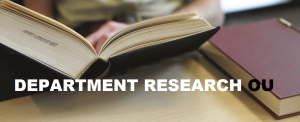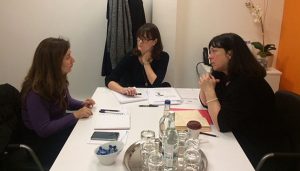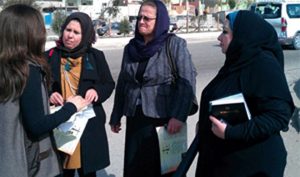Dennis Walder, Emeritus Professor of Literature
It was the mid 1970s, I’d left South Africa, and was a Research Fellow at Edinburgh University, doing a PhD on Dickens and teaching there to supplement my income. I had heard about a radical new university offering degrees for mature, unqualified students, and when my friend the historian Angus Calder offered to let me sit in on one of his tutorials, I jumped at the chance.
I was amazed by the enthusiasm and motivation, as well as life experience, of Angus’s students, compared with my Edinburgh University first years. Conventional university teaching seemed just that – conventional; and, what’s more, it served a very limited section of the population. At the time, only 4% of school leavers were admitted to university, and almost everyone seemed well satisfied with that. But I was not.
So I applied for and became a tutor on the 19th century Novel course, which, unlike elsewhere at the time, assumed that you should study the novel as a European phenomenon, including texts in translation. After being appointed Arts Staff Tutor in Scotland and meeting the course team led by Arnold Kettle, I began to contribute more and more, since I was a Nineteenth Century Novel specialist.
I was seconded to Walton Hall to help revise and rewrite the (already hugely popular) course, and when a post fell vacant, I applied for and was appointed Lecturer and became chair of the new novel course team which, in those days (the 1970s-80s), included central academics, staff tutors, editors, production advisors, administrators, BBC colleagues and external assessors, all of whom would vigorously contribute to discussion and debate, with the result that our course materials – published booklets, radio and TV programs and summer schools – were of the highest quality.
The course team was and still is even in its slimmed-down versions the key, and I remain suspicious of attempts by other universities (increasingly nowadays) to offer distance material without this kind of input. My own former Edinburgh PhD supervisor once confessed that he took our materials with him when preparing to teach in the USA; it was a common experience to find well-thumbed copies of our texts in other university libraries and on their lecturers’ shelves.
Acceptance of academic quality was more formally assured by being part of the national external examining system: we examined elsewhere and, more importantly, colleagues from other universities examined with us. I recall one external exclaiming at a Board: ‘I agree this should be a first, but . . . perhaps not a transcendental first!’ Yet our classifications were increasingly accepted by other universities as well as by employers, irrefutable evidence that the OU was a ‘proper’ university, our graduates as good as any, often indeed – given their motivation and hard work over many years – better.
The Arts Foundation courses (for which I wrote) and which were repeatedly revised, seemed our most radical departure from the traditional curriculum, truly inter- rather than simply multidisciplinary, and a key to all the other Arts courses. The Literature curriculum was relatively traditional, perhaps to ensure its status, perhaps because of the orthodox backgrounds of the teaching staff (although Kettle had taught in East Africa).
I had long been impressed by the writings of former Anglophone colonies, and had begun publishing on South African drama, especially Athol Fugard (I wrote the first book on his work), and I proposed including a play by him and two black actors on a new Modern European Drama course. It did not strictly fill the bill, but after much debate the team agreed to include it as ‘political drama’, beside Brecht and John Arden, and in 1977 Sizwe Bansi is Dead became the first of the ‘New Writings’ to enter the curriculum. The student response, especially to the TV version, was tremendous.
This strengthened my resolve to propose other ‘post-colonial’ (as they were starting to be called) texts for the curriculum. Our new third-level ‘Literature in the Modern World’ course offered the opportunity. With Angus Calder, Dinah Birch and Richard Allen, we wrote ‘blocks’ of teaching material on poetry, prose and drama from West Africa, the Caribbean and India, adopting the phrase ‘literatures in English’ instead of English Literature, to encourage an awareness of growing debates about the origin and nature of contemporary literary studies, and to prevent writings from abroad being ghettoised. We developed a related summer school at York, and I edited a reader of critical essays and documents, widely used outside the OU and revised for a second edition which remains in print with sales of over 60,000.
‘Literature in the Modern World’ was four years in the making and served some 10,000 students before being replaced by another Twentieth Century Literature course, chaired by Suman Gupta, which continued to highlight current debates, while incorporating texts dealing with contemporary society, now inevitably including writings from beyond as well as within the UK, by migrants as well as by long-established citizens. In terms of quality as well as relevance, the work of authors as diverse as Chinua Achebe, Derek Walcott, Nadine Gordimer, Grace Nichols and Abdulrazak Gurnah was always going to have an impact.
At the same time, I joined History colleagues to set up a ‘project’-based ‘fourth-level’ course, with several lines involving minimal teaching material but substantial reading and set texts, aimed at bridging undergraduate and postgraduate levels (the MA was still in its infancy) through more independent student work. We taught the courses we were creating, believing it had always been a blunder to allow fulltime OU academics to create courses and appoint and monitor tutors (ALs) without teaching face-to-face themselves, and not only at occasional day and summer schools. The result was hugely rewarding for all concerned, producing students who did go on to postgraduate work, although numbers were inevitably limited by the nature of the provision.
Yet with the Department personnel expanding under my headship to include fellow experts like Robert Fraser, David Johnson and Susheila Nasta, it had become possible for a wider range of texts, voices and countries to be included on my project course (‘Post-Colonial Literatures in English’). At the same time, while involved in setting up a Singapore version of the Arts program, I engaged with Ban Kah Choon of the National University there to write a Singapore version of the course focusing on local authors and texts to ensure their voices were dominant, not just ours from the UK. Without a course team, the results were uneven: it was difficult to replicate the depth and accessibility of the UK-based course.
University teaching material should always be informed by research, and it seemed natural to set up a research group while developing these initiatives – although as one colleague remarked at the time, mine was at first a group of one. I was not fazed, and the Postcolonial Research Group has now survived for many years, organizing seminars, raising substantial funds from UK research bodies, and creating a Departmental culture in touch with developments in this still vital area of present-day literary study, whatever it is called – ‘world literatures’ is a recent favourite. The skills involved in critical reading are transferable, and the point remains to highlight the issues raised by any study of literature with texts suggestive of experiences beyond narrowly-defined European national cultures, through teaching that recognizes the claims of history and politics as well as aesthetics. Or so I believe.





